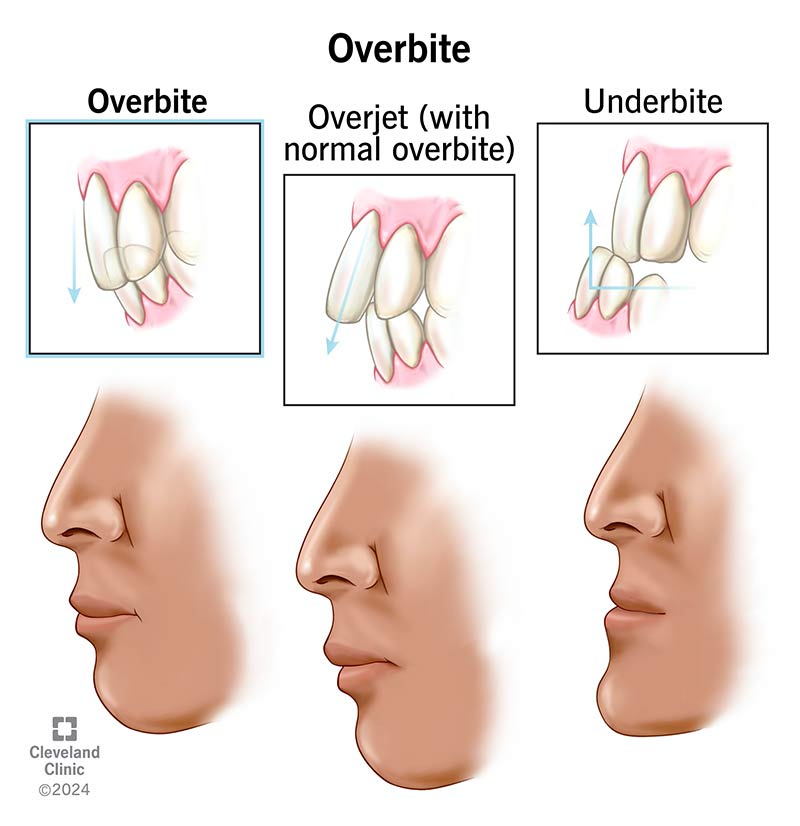Overbite refers to a vertical misalignment of your teeth. It happens when your upper teeth overlap your lower teeth more than they should. Left untreated, overbite can cause oral health issues like jaw pain, tooth erosion and gum disease. Treatment options include orthodontics and oral surgery.
Advertisement
Cleveland Clinic is a non-profit academic medical center. Advertising on our site helps support our mission. We do not endorse non-Cleveland Clinic products or services. Policy

Image content: This image is available to view online.
View image online (https://my.clevelandclinic.org/-/scassets/Images/org/health/articles/overbite)
An overbite is a type of malocclusion (“bad bite”). It occurs when your upper teeth overlap your lower teeth more than they should.
Advertisement
Cleveland Clinic is a non-profit academic medical center. Advertising on our site helps support our mission. We do not endorse non-Cleveland Clinic products or services. Policy
A small overbite is normal. In fact, it’s necessary for proper health and function. But if your upper teeth overlap your lower teeth more than 2 to 4 millimeters, it’s an overbite — and it could cause jaw pain, tooth erosion and other oral health conditions.
Like overbite, overjet is a type of malocclusion. These terms sound similar but mean something different:
The main symptom of an overbite is that your upper front teeth overlap your lower front teeth more than they should. A severe overbite is more noticeable than a minor overbite. But this type of malocclusion can affect more than just your appearance.
Overbites can also result in:
In some cases, malocclusion is genetic (runs in families). Genetic traits, like your jaw shape, can affect the alignment of your teeth.
Advertisement
Other overbite causes include:
Left untreated, an overbite can lead to health complications like:
Typically, your dentist is the healthcare provider who first notices an overbite during a physical exam. They might take dental X-rays to further examine how your teeth align.
The dentist may refer you to an orthodontist. An orthodontist is a dentist who specializes in tooth and jaw alignment.
Anyone with an overbite can receive treatment. But the type of treatment you need depends on several factors, including the severity of overbite and your age. Overbite treatment varies for children and adults.
Because children are still growing, their bones are softer and their teeth move more easily. As a result, dentists can often fix overbite in kids with orthodontics alone.
Overbite treatment for children may involve:
Adults still benefit from orthodontic treatment — and in some instances, orthodontic treatment might be all you need. But some severe cases require corrective jaw surgery in addition to braces.
Overbite treatment for adults may involve:
That depends on your overall goals. If you’ve been living with an overbite and you’re ready to correct it, schedule an appointment with a dentist or orthodontist. They can tell you how severe your overbite is and whether you need treatment.
If you have an overbite but you’re not ready for treatment, there are things you can do to reduce your risk of complications in the meantime:
Some people are born with an overbite. You can’t prevent that. But there are things you can do to reduce the likelihood that your child will develop an overbite during the early stages of life:
Advertisement
You should see your dentist every six months or at a frequency they recommend. During these visits, they can keep an eye on your oral health. If your overbite interferes with the health or function of your teeth, they’ll recommend treatment.
Advertisement
If you notice any new symptoms between visits, it’s important to let your dentist know. This includes pain, infection or tooth mobility. These things can’t wait until your next routine cleaning.
If you have an overbite, here are some questions you might want to ask your dentist:
Unless it’s severe, you might not even know you have an overbite — when your upper teeth overlap your lower teeth more than they should. And not everyone with an overbite needs treatment. But if your dentist uses this term, ask how it affects your oral health. Treating it sooner rather than later can reduce your risk of further issues.
Advertisement

Sign up for our Health Essentials emails for expert guidance on nutrition, fitness, sleep, skin care and more.
Learn more about the Health Library and our editorial process.
Cleveland Clinic’s health articles are based on evidence-backed information and review by medical professionals to ensure accuracy, reliability and up-to-date clinical standards.
Cleveland Clinic’s health articles are based on evidence-backed information and review by medical professionals to ensure accuracy, reliability and up-to-date clinical standards.
Dentistry plays an important role in oral health. Cleveland Clinic’s experts can design a personalized plan that will keep you smiling for the long haul.
